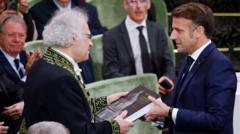NEW YORK — Merriam-Webster has announced an exciting overhaul of its Collegiate Dictionary, marking the release of its 12th edition on November 18. This freshly revised edition stands out with the addition of over 5,000 new words, including intriguing terms such as 'petrichor,' which describes the pleasant smell that accompanies rainfall after a dry spell, and 'ghost kitchen,' referring to a commercial cooking space that delivers food without a storefront.
The overhaul arrives 22 years after the last major update and comes at a time when print dictionary sales have been in decline. Preorders for the 12th edition are now available, and this release aims to breathe new life into the print dictionary by embracing contemporary language trends and user experience.
This new edition strategically sheds underused biographical and geographical sections that many users no longer consult, focusing instead on words that reflect modern vernacular and technology. Popular additions include terms like 'adulting,' 'cold brew,' 'WFH' (work from home), and 'cancel culture.'
Greg Barlow, president of Merriam-Webster, expressed the company’s intent to make the dictionary more engaging and practical. Each entry has been curated to enrich the reading experience, with more than 20,000 new usage examples provided, helping users connect with the language in practical terms.
While sales of dictionaries and other adult reference books have decreased, Merriam-Webster continues to thrive with annual sales of about 1.5 million copies. The new Collegiate edition not only targets traditional dictionary users but also younger generations intrigued by enhanced digital access and mobile app offerings.
As consumers show a renewed interest in maintaining physical reference materials at home, bookstores like Barnes & Noble report an uptick in dictionary sales in recent months, suggesting that a fondness for tangible books persists amidst a digital age.
Despite potential concerns regarding the relevance of print dictionaries, experts argue for their cultural significance and usefulness for communities with undocumented languages. Initiatives to preserve and legitimize language through print dictionaries remain essential, highlighting the multifaceted role dictionaries play in our lives beyond mere word definitions.
In conclusion, the 12th edition of Merriam-Webster's Collegiate Dictionary endeavors to captivate language enthusiasts while adding a touch of nostalgia, underscoring that print dictionaries have not yet reached their final chapter.
}






